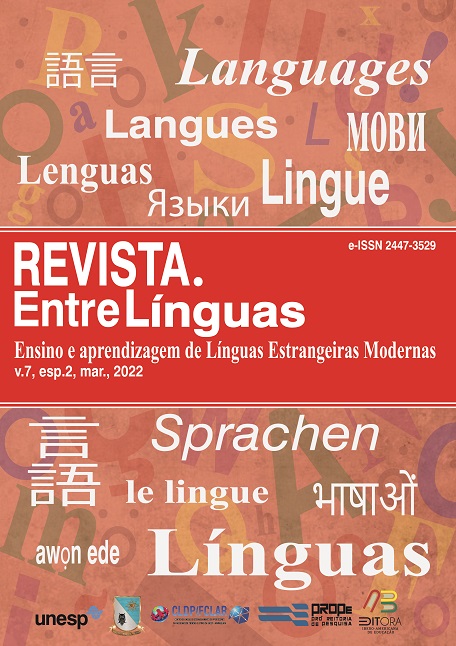On the role of associative perception in the process of scientific literature translation
DOI:
https://doi.org/10.29051/el.v8iesp.2.17483Keywords:
Associative perception, Scientific terminology, Ultimate comprehension, Erroneous borrowingsAbstract
The purpose of this article is to discuss the possibilities of the method of associative perception of terminology in the process of translating scientific and technical literature. In the process of work, authors used traditional research methods along with experimental ones. Translation of scientific and technical texts requires certain skills and competencies from specialists of this type of activity. Perfect command of the terminology of a particular language, knowledge of its features and structure enables the translator to convey the content of the original text as accurately as possible without distorting the meaning. Authors conclude that it is necessary that the translator of scientific and technical texts must be aware of the latest technical innovations and discoveries in a particular field of technology.
Downloads
References
ABRAMOVA, N. E. Associative technologies of diagnostics of language signs. Yekaterinburg: Ural State Pedagogical University, 2018.
BOYARSKAYA, M. M. Problems of ambiguity in modern English. In: Collection of articles of the FIYA MAI. Moscow: Pero Publishing House, 2016.
DENISOVA, O. I. On the problem of neology in modern English. In: KALLIOPIN, A. K. (Ed.). Proceedings of the second scientific and practical conference "Actual problems of the theory of language and teaching of foreign languages". Moscow: "MAX Press", 2010.
LITVINOVA, M. Y. The term as the most important component of the vocabulary of the scientific and technical text of aviation topics. In: Collection of articles of the FIYA MAI. Moscow: Pero Publishing House, 2016. p. 156-167.
LURIA, A.R. Language and consciousness. St. Petersburg: Publishing House Peter, 2020.
NIKULINA, M.A. On the issue of interference in literal and functional-communicative translation. In: Professionally-oriented translation: Reality and perspectives. Moscow: RUDN Publishing House, 2012. p. 271-277.
OZHEGOV, S.I.; SHVEDOVA, N. Y. Explanatory dictionary of the Russian Language. Moscow: Publishing house Atberg 98, 2010.
SELIGEEVA, I. R. On the problem of formation of associative thinking of students in the system of additional education. Izvestiya VSPU, v. 3, n. 276, p. 15-17, 2017.
VEDENSKAYA, T. E. Modern methodological problems of linguistics. In: KALLIOPIN, A.K. (Ed.). Proceedings of the second scientific and practical conference "Actual problems of the theory of language and teaching of foreign languages". Moscow: "MAX Press", 2010.
VLASOVA, S. V. The role of translation correspondences in teaching scientific and technical translation to students of aerospace specialties. In: Collection of articles of the FIYA MAI. Moscow: Pero Publishing House, 2016. p. 138-146.
ZINCHENKO, V. P. Image and activity. Moscow: Publishing House of the Institute of Practical Psychology; Voronezh: NGO "MODEK", 1997.
Published
How to Cite
Issue
Section
License

This work is licensed under a Creative Commons Attribution-NonCommercial-ShareAlike 4.0 International License.
Os manuscritos aceitos e publicados são de propriedade da Revista EntreLínguas. Os artigos publicados e as referências citadas na Revista EntreLínguas são de inteira responsabilidade de seus autores.
Transferência de direitos autorais – autorização para publicação
Caso o artigo submetido seja aprovado para publicação, já fica acordado que o(s) autor(es) autoriza(m) a UNESP a reproduzi-lo e publicá-lo na EntreLínguas, entendendo-se os termos “reprodução” e “publicação” conforme definição respectivamente dos incisos VI e I do artigo 5° da Lei 9610/98. O artigo poderá ser acessado pela rede mundial de computadores (Internet), sendo permitidas, a título gratuito, a consulta e a reprodução de exemplar do artigo para uso próprio de quem a consulta, desde que haja a citação ao texto consultado. Essa autorização de publicação 328 EntreLínguas, Araraquara, v. 1, n .2, p. 323-328, jul./dez. 2015 não tem limitação de tempo, ficando a UNESP responsável pela manutenção da identificação do(s) autor(es) do artigo. Os artigos publicados e as referências citadas na Revista EntreLínguas são de inteira responsabilidade de seus autores.











